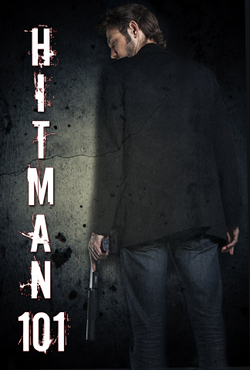Review: Josef Kilián (1963)
Cast: Pavel Bartl, Pavel Silhánek, Stanislav Michler
Director: Pavel Jurácek | Jan Schmidt
Country: Czechoslovakia
Genre: Short , Drama
The following review is a continuation of Rowena’s Spotlight on the Czechoslovak New Wave.
A Character In Need Of Support is generally known in English as Josef Kilián. Regardless of the title used, it is a less than obvious film with which to begin this spotlight on the Czechoslovak New Wave. But that is partly the point. That it presents the diversity of aesthetic and sociopolitical references indicative of the politico-cultural ferment of the time is also the point. It is a short film, clocking in at just under forty minutes; it is a collaboration between two FAMU graduates; and above all, it deftly and comically brings together avant-garde roots at home and abroad, the rehabilitation of Franz Kafka within the history and development of Czech literature, the comedy and theatre of the absurd, jabs at bureaucracy, and the openness of form where fragments outweigh an overarching narrative logic to represent physical, everyday reality.
Josef Kilián is the debut co-directorial effort of Pavel Juráček and Jan Schmidt, based on a story by the former, following their graduation from FAMU. (Some folks tend to consider Juráček as the overall author of the film, with Schmidt as collaborator in name only.) Juráček and Schmidt had worked together at FAMU; they would go on to co-direct one more time for The End of August at the Hotel Ozone (1967). Between the two films, Josef Kilián is by far the more interesting and engaging work. The End of August at the Hotel Ozone’s narrative, also written by Juráček, of a post-apocalyptic world where a group of women hunt and wander in search of a man with whom to procreate leaves one rather cold, indifferent, and at times disgusted by the gratuitous killing of animals in the process, no matter what level one reads it; one only wishes that it had been a short film of less than half an hour instead of its nearly eighty minutes. (Petra Hanáková calling Juráček “probably the most misogynistic writer and director of the Czech New Wave” may also have something to do with its distastefulness.)
In contrast, Josef Kilián’s nearly forty minutes’ running time are well explored. And for all of its diversity of references and things that make up its trajectory from beginning to end, it is amazingly smooth-edged. Using ‘trajectory’ over ‘narrative’ is intentional here, for the happenings in the film are presented in such a way that it is difficult to anticipate where it is going or what will occur next. How the male protagonist Herold walking through a shoddy hallway filled with propaganda placards at the beginning of the film finds himself in search of a cat rental agency that has disappeared is absolutely fundamental to the film’s comedy, satire, charm, and playfulness. The way it harnesses these characteristics simultaneously, with little dialogue at that, is kind of staggering; and it does so in an unassuming way, making it even more ironically endearing in its disorientation. Its open, fragmentary form and pursuit of the Surrealist marvelous in the quotidian nevertheless contain a clear development, which prevents it from falling into annoying senselessness altogether.
How the male protagonist Herold walking through a shoddy hallway filled with propaganda placards at the beginning of the film finds himself in search of a cat rental agency that has disappeared is absolutely fundamental to the film’s comedy, satire, charm, and playfulness.
 The film begins with a long shot that looks upon an empty street. The street perpendicular to the camera hosts a series of processions that could be interpreted as the stages of life: a teacher leading schoolchildren all dressed in white; soldiers marching; and a funeral procession. From the small crowd of people who follow the hearse on a horse-drawn carriage, the only man not dressed in black stays behind and walks towards the camera. He enters a building, walks through one hallway and enters into another, on the left and right sides of which are abandoned propaganda placards. At the end of the hallway is a door, right before which is perched a big poster of Joseph Stalin. The man walks through the door that leads to a room with musicians and a stage. The first dialogue ensues, six minutes into the film, as the man asks two musicians if they know where Josef Kilián is located; the man wants to tell Kilián that someone has died. With that, the search for the elusive Josef Kilián begins.
The film begins with a long shot that looks upon an empty street. The street perpendicular to the camera hosts a series of processions that could be interpreted as the stages of life: a teacher leading schoolchildren all dressed in white; soldiers marching; and a funeral procession. From the small crowd of people who follow the hearse on a horse-drawn carriage, the only man not dressed in black stays behind and walks towards the camera. He enters a building, walks through one hallway and enters into another, on the left and right sides of which are abandoned propaganda placards. At the end of the hallway is a door, right before which is perched a big poster of Joseph Stalin. The man walks through the door that leads to a room with musicians and a stage. The first dialogue ensues, six minutes into the film, as the man asks two musicians if they know where Josef Kilián is located; the man wants to tell Kilián that someone has died. With that, the search for the elusive Josef Kilián begins.
Looking for someone whose frustrating elusiveness is presumably linked to the state and power certainly smacks of the work of Kafka. More obviously Kafka-esque is the name “Josef Kilián,” which recalls “Josef K.” in Kafka’s novel The Trial (1925). The film’s later sequences of the protagonist walking through endless hallways and stairways in a building to plead his case of returning the cat he rented from the disappeared cat rental agency also recalls the absurd, isolated, alienated situations in which some of Kafka’s heroes find themselves (not to mention Orson Welles’ film adaptation of The Trial, released in 1962). Such Kafka-esque tension and concerns with state bureaucracy, obedience, and belittlement of the individual are at once magnified and rendered more comically absurd through the image of Herold throughout the film walking around the streets, hallways, and an outdoor drinking hall with his briefcase, from which the head of the rented cat protrudes like a curved-handle of an umbrella. At the same time, “Josef Kilián” in reference to someone who has died could also be a reference to another Josef, that is, Stalin, who died exactly ten years before.
But the film never pushes any of these interpretations down the spectator’s throat; it is content with dangling these ideas for anyone to take and engage with however s/he wants. If anything, the film above all adheres to an openness and/or multiplicity of form and meaning, encapsulated by the oft-articulated line, “I don’t understand (you).” This running phrase refers to several things in the film and describes rather aptly the film’s form as well. For one thing, “I don’t understand (you)” kicks off the search for Josef Kilián, as one of the musicians utters this phrase to Herold before they part. The phrase populates the sequences of people in the streets where Herold passes by before he discovers the cat rental agency and then discovers its disappearance the following day. It also describes the strange situation in which Herold finds himself, including the state protocol he must follow to prevent the case from being a blot on his record. By extension, it describes the situations of the group of people with whom Herold waits in one of the rooms in the building, including another man who for some reason carries a portable shower everywhere he goes.
the film above all adheres to an openness and/or multiplicity of form and meaning, encapsulated by the oft-articulated line, “I don’t understand (you).”
 At the level of form, “I don’t understand (you)” also refers to the film’s disjointed representation of dialogue. In the first sequence at Herold’s apartment, upon entering one hears a woman’s voiceover while one only sees Herold and the cat. Only several shots later does the film reveal Herold reading a letter from his mother to which the voiceover refers. In a sequence with Herold and a state official, the initial part of their dialogue consists of quick, short shots of the official replying to Herold’s questions, heard off-screen; needless to say, the official’s comments are random. In the street sequence of people uttering varying statements of incomprehension as Herold passes them by, with freeze frames succeeding each utterance of “understand,” the resulting collage strongly recalls the poem “Lundi rue Christine” (1918) by proto-Surrealist writer Guillaume Apollinaire. Apollinaire “wrote” the poem by randomly stitching together phrases that he had heard on a Monday at Christine Street (hence the poem’s title). The same could be said for the sequence when Herold asks passersby if they happen to know what happened to the disappeared cat rental agency and gets a myriad of ir/relevant responses.
At the level of form, “I don’t understand (you)” also refers to the film’s disjointed representation of dialogue. In the first sequence at Herold’s apartment, upon entering one hears a woman’s voiceover while one only sees Herold and the cat. Only several shots later does the film reveal Herold reading a letter from his mother to which the voiceover refers. In a sequence with Herold and a state official, the initial part of their dialogue consists of quick, short shots of the official replying to Herold’s questions, heard off-screen; needless to say, the official’s comments are random. In the street sequence of people uttering varying statements of incomprehension as Herold passes them by, with freeze frames succeeding each utterance of “understand,” the resulting collage strongly recalls the poem “Lundi rue Christine” (1918) by proto-Surrealist writer Guillaume Apollinaire. Apollinaire “wrote” the poem by randomly stitching together phrases that he had heard on a Monday at Christine Street (hence the poem’s title). The same could be said for the sequence when Herold asks passersby if they happen to know what happened to the disappeared cat rental agency and gets a myriad of ir/relevant responses.
Such details contribute to the feeling of a labyrinth without a center, which the conclusion only heightens in a droll way. With its breezy cinéma vérité location shooting mixed with the quiet, muffled menace of the bureaucratic interiors of corridors and offices, Josef Kilián is a marvelous work of biting observation and absurdity that helped to herald the Czechoslovak New Wave.



















 Review: God Bless America (2011)
Review: God Bless America (2011) Review: Touchback (2011)
Review: Touchback (2011) Review: The Cabin In The Woods (2011)
Review: The Cabin In The Woods (2011) Review: Titanic 3D (2012)
Review: Titanic 3D (2012) Review: Case For A Rookie Hangman (1969)
Review: Case For A Rookie Hangman (1969)

